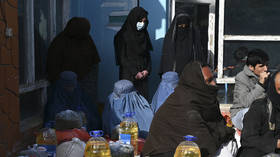US moves to thaw $7bn in frozen Afghan funds

The US government has begun freeing up some $7 billion in frozen Afghan funds held in American banks on Friday – without providing Taliban access to the money. The White House announced the move as part of a plan to tackle the “widespread humanitarian crisis” in Afghanistan, which it deemed a “national emergency.”
President Joe Biden issued an executive order that invokes emergency powers to require US financial institutions to consolidate and “block” the assets – which belong to the Da Afghanistan bank, the country’s central bank. The move earmarks some $3.5 billion toward aid efforts, though the amount ultimately to be transferred depends on various ongoing litigation efforts to compensate US victims of Taliban terrorism, including relatives of those who died in the September 11 attacks.
The order came as Washington – which has rejected Taliban calls to release the money and has not recognized the militant group as Afghanistan’s legitimate government – faced a court deadline on Friday to declare its position on the victim groups’ lawsuits. In recent weeks, the Biden administration has also come under pressure from Congress to use the funds to address economic and humanitarian crises in Afghanistan.
International funding to Afghanistan was suspended after the Taliban takeover last August, leaving billions of dollars and assets belonging to the country trapped abroad. According to the New York Times, a little over $7 billion had been left in US banks, including the Federal Reserve Bank of New York, which cited uncertainty over who had legal authority to the money to make the funds unavailable for withdrawal. Biden’s order will further hobble Afghanistan’s already stricken central bank, the paper reported.
The US government will look to facilitate access to half of those assets for “the benefit of the Afghan people and for Afghanistan’s future,” according to a White House fact sheet on Friday, without going into detail about what that process would look like. It also said that American victims of Taliban attacks should get a “full opportunity to have their claims heard in court,” with “more than $3.5 billion in DAB assets” remaining in the US as a compensation fund for the plaintiffs.
The New York Times noted that it was “highly unusual” for the US to “commandeer” a foreign country’s assets, with the paper reporting that the amount marked for aid efforts could eventually be placed in a trust fund that would finance assistance while bypassing the Taliban. But setting this up is expected to take several months, unnamed sources said.
The Taliban has criticized the move as “theft” with Mohammad Naeem, a spokesman for the group’s political office, describing it as “the lowest level of human and moral depravity.” The group has previously called on the international community to release funds and help stave off a humanitarian disaster as its economy continues to falter. Afghanistan has over $9 billion in reserves, with the remainder of its assets in Germany, the United Arab Emirates, and Switzerland.
Last month, the UN called for nearly $5 billion in aid to Afghanistan, warning that nearly 90% of the country’s 38 million people had fallen below the poverty line and that more than one million children were at risk of starvation.













